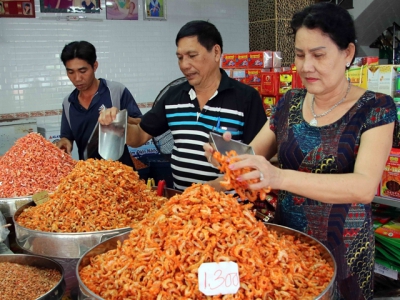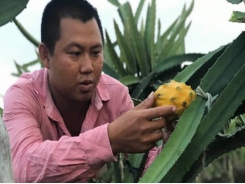Cà Mau promotes cooperation between agricultural co-operatives and companies

CÀ MAU — Agricultural co-operatives, companies and other partners in Cà Mau Province have worked together to produce benefits for stakeholders, especially farmers.
Dried shrimp is a common agricultural product in Cà Mau Province. – VNA/VNS Photo Kim Há
The province’s Department of Agriculture and Rural Development has helped link 22 companies and 23 shrimp farming co-operatives and co-operative groups to develop a value chain for shrimp.
The shrimp farming co-operatives and co-operative groups include 800 farmers who breed shrimp in a total area of more than 1,300ha with advanced farming techniques.
The Cái Bát Aquaculture Co-operative in Cái Nước District’s Hòa Mỹ Commune is one of them. Cái Bát was established in 2013 and has 127 members.
Thirty-five members of Cái Bát are breeding shrimp on a total of 30ha under Aquaculture Stewardship Council (ASC) standards, while 54 members are breeding in an area of 348ha under Vietnamese good agricultural practices (VietGAP) standards.
Nguyễn Văn Lâm, chairman of the Cái Bát management board and director of Cái Bát co-operative, said the co-operative has effectively worked with companies in buying material inputs and selling shrimp.
Under the co-operation, Cái Bát’s members buy shrimp fry at 15 Việt Nam đồng cheaper than the market price and shrimp feed at VNĐ5,000 – 7,000 a kilo cheaper than the market price.
Cái Bát’s members buy medicine and bio-products for breeding shrimp at prices 20 – 25 per cent lower than the market price.
The southernmost province, which is the country’s largest shrimp producer, has more than 280,000ha of shrimp with an annual output of 176,500 tonnes. Its shrimp is exported to 82 countries and territories.
Châu Công Bằng, deputy director of the department, said the province’s agriculture is shifting towards advanced techniques and exploiting its potential to develop sustainably.
Support for co-operatives that produce agricultural products with a value chain is necessary for the province’s agriculture restructuring, he said.
“This is considered a solution for increasing the value of products and sustainable agriculture,” he said.
The cooperation has also created favourable conditions for State management and for consumers to trace the origin of agricultural products.
Farming areas zoned with comprehensive infrastructure like irrigation, road and waste treatment systems have been established.
However, the cooperation still has problems, including the lack of legal regulations on farming contracts and the weak capacity of co-operative managers.
Some support policies for co-operatives have not been implemented promptly and members have not joined as a result. The operational efficiency of co-operatives must be enhanced, Bằng said.
Model co-operatives should be expanded to promote their key role in cooperation, he said.
The province has supported transfer of advanced techniques for post-harvest handling and processing, and provided soft loans for co-operatives.
The province has 130 agricultural co-operatives and they each have an average of 21 members and an annual revenue of VNĐ850 million (US$36,700), according to the Department of Agriculture and Rural Development.
The province targets establishing about 120 new co-operatives and 100 new co-operative groups each year from now to 2030.
It has diversified agricultural products, including shrimp, rice, mud crab, honey, dried shrimp and dried fish.
Related news
Tools

Phối trộn thức ăn chăn nuôi

Pha dung dịch thủy canh

Định mức cho tôm ăn

Phối trộn phân bón NPK

Xác định tỷ lệ tôm sống

Chuyển đổi đơn vị phân bón

Xác định công suất sục khí

Chuyển đổi đơn vị tôm

Tính diện tích nhà kính

Tính thể tích ao



 Problematic: Experts call for regulation of Đà Lạt’s…
Problematic: Experts call for regulation of Đà Lạt’s…  Vietnamese farmers succeed in growing exotic fruits
Vietnamese farmers succeed in growing exotic fruits